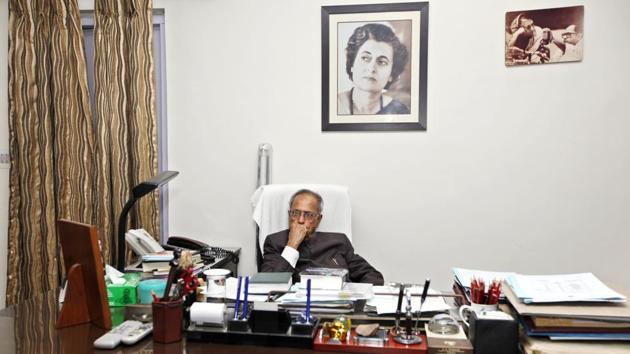In memoir, Pranab blames Manmohan, Sonia for Cong’s defeat, says Modi govt’s first term autocratic
The Presidential Years is the fourth volume of Mukherjee’s memoirs and will be released in January 2021.
A soon-to-be-released autobiography by former President Pranab Mukherjee blames Congress chief Sonia Gandhi and then Prime Minister Manmohan Singh for the party’s devastating loss in the 2014 general elections, and contends that Prime Minister Narendra Modi employed an autocratic style of governance during his first term in power, the book’s publisher announced on Friday.

Mukherjee, who was a senior minister in the United Progressive Alliance government and the Congress party’s chief troubleshooter before his term as President between 2012 and 2017, died in August. His new book, The Presidential Years, is the fourth volume of his memoirs and will be released in January 2021.
The statements attributed to Mukherjee are from a statement released by Rupa books on Friday. HT has not seen a copy of the book or directly verified the excerpts, which are yet to be released.
“While Dr Singh was preoccupied with saving the coalition, which took a toll on governance, Modi seemed to have employed a rather autocratic style of governance during his first term, as seen by the bitter relationship among the government, the legislature and the judiciary,” he wrote, according to the statement. “Only time will tell if there is a better understanding on such matters in the second term of this government.”
According to the statement, the former President — whose 85th birth anniversary was celebrated on Friday — wrote in his first-person account that he believed the moral authority to govern was vested with the PM and the state of the nation was always reflective of the functioning of the PM and their administration.
Mukherjee, who was a senior leader of the Congress party for five decades and held almost every senior position in the party and central government, had strong words for his party’s functioning.
“I do believe that the party’s leadership lost political focus after my elevation as president. While Sonia Gandhi was unable to handle the affairs of the party, Dr Singh’s prolonged absence from the House put an end to any personal contact with other MPs,” he wrote. In the 2014 general election, the Congress slumped to its worst performance and won only 44 of 543 Lok Sabha seats. He wrote that there was section of leaders who believed that if he was elevated as PM in 2004 — when the Congress stitched together a coalition to snatch power with an unexpectedly strong showing in the general elections — the party’s poor performance in the 2014 Lok Sabha polls could have been averted. But, he added, he did not subscribe to this view.
Mukherjee’s memoir comes amid a firestorm raging within the Congress over its internal processes as senior leaders publicly express their displeasure following a series of electoral reverses. In August, a group of 23 leaders wrote to party chief Gandhi demanding internal reforms.
Leaders from the Congress and the Bharatiya Janata Party (BJP) refused to comment.
In the book – replete with rare photos and handwritten notes, according to Rupa – Mukherjee also touched on the diplomatic tension that apparently flared up during the visit of US President Barack Obama in 2015 when the US Secret Service insisted Obama travel in a specially armoured vehicle brought from the US, and not in the car designated for use by the Indian head of state.
“They wanted me to travel in the same armoured car along with Obama. I politely but firmly refused to do so, and requested the MEA to inform the US authorities that when the US president travels with the Indian president in India, he would have to trust our security arrangements. It cannot be the other way around,” he said, according to the statement.
The memoir, the publisher said, also focused on his journey from a remote village in Bengal to Rashtrapati Bhavan, and how he reshaped the presidency, the Rupa statement added. The book also recollected the challenges he faced as President, the difficult decisions he made and the tightrope walk he undertook to ensure that both constitutional propriety and his opinion were taken into consideration.
“If he were still alive, he would have been thrilled to note the widespread excitement among readers to read this extremely well-written autobiography. It’s so personal in tone that to me it almost seems like the former President is sitting in his study with a cup of tea (and shingara) and narrating his story,” said Kapish G Mehra, managing director, Rupa Publications India.






